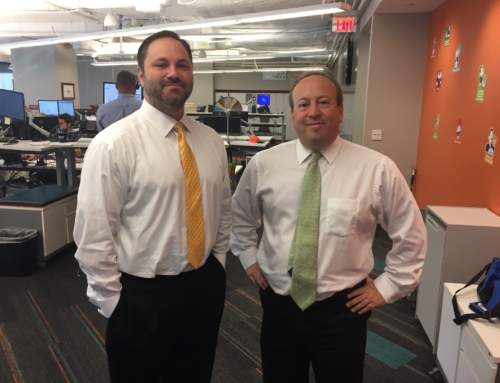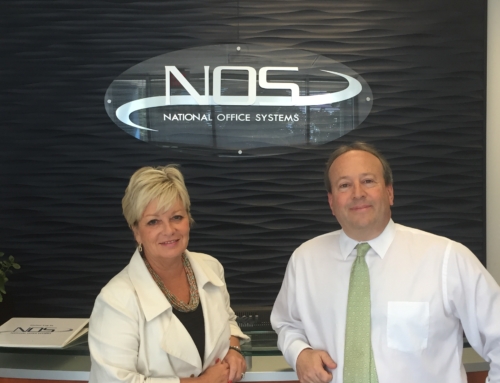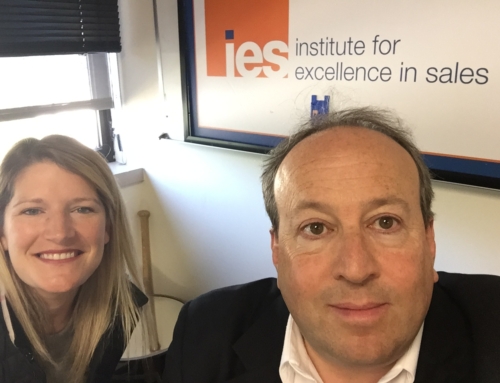By Fred Diamond, IES Executive Director
The IES mentor program has been one of those experiments that surprised me, because our members – those new to the sales profession and those who are quite seasoned – took advantage of it faster than I could imagine. It’s been such a success that the program has grown way beyond our original expectations. As such, I wonder if you’ve had success using a mentor specifically to help you as a sales professional?
Sometimes I’m wrong; I admit it. For example, I used to be a late night person who wrote and sent emails, drafted proposals, and created presentations until 2am. Two  years ago, a mentor advised me to shift to being an early morning riser incorporating morning rituals. I was skeptical but now I regularly get up around 5am, start my day more energized and refreshed and am much more productive.
years ago, a mentor advised me to shift to being an early morning riser incorporating morning rituals. I was skeptical but now I regularly get up around 5am, start my day more energized and refreshed and am much more productive.
For another example, I never really appreciated why so many people got so excited about grilling and eating outside, until a mentor introduced me to the Weber chimney. Now, grilling is a joy. I was wrong and I admit it.
IES MEMBERS UNDERSTOOD THE VALUE OF SALES MENTORING BEFORE I DID
When an adviser recommended that the Institute for Excellence in Sales should launch a mentor-protégé program for members, I was skeptical. I wasn’t convinced that anyone would be interested in participating. I did not see the value in sales mentoring at the time for the following reasons.
- First, I was not sure that the protégés would be comfortable being truly honest with the more experienced members who would be devoting their time as mentors.
- Second, I was not sure that those members in the beginning stages of their careers would be able to implement many of the suggestions that their mentors would offer and would soon get frustrated.
- Third, since many of our more seasoned members were wildly successful already in sales, I was not sure that they would be interested in getting advice from anyone, even from wiser advisers.
I was wrong. And surprised. But, again, I can admit when I’m wrong.
HERE’S WHAT HAPPENED ONCE WE LAUNCHED THE PROGRAM
One of our members, Philip Martin, put together a strong program with a refined set of expectations for mentors and protégés. We extended this benefit to all IES members from the start of their membership, making participation in the mentor program an option. Dozens of applications came in from experienced professionals who would be high quality mentors. Very quickly, many members signed up to be matched with a mentor.
Since many of the mentoring interactions are done via Skype or on the phone, we’ve been able to connect with new member candidates around the world, some as far away as the Philippines.
I started looking at sales mentoring in a new light. Realizing I might have been wrong, I pulled together a list of the people who had played a high-value mentoring role for me and the count was way over a dozen, just in the past five years! I have not been shy in asking for guidance from them, so why did I think others would not be interested in getting similar value?
My list of mentors included my boss of many years ago while I was at Compaq. Gary Newgaard helps reduce what I thought to be complex to simple and still makes time for me twenty years hence.
Another mentor over the past five years is CEO and Board Advisor Art Medici who helped me figure out how to strategically communicate the value of the IES to senior executives.
Two other high-value mentors on my list are Larry Rosenfeld and Julie Murphy of Sage Communications, who have provided valuable guidance on our communications strategies. Even though Julie is much younger than I am, I was able to learn from her because she has a wonderful grasp on business communications. And there were dozens of others I can tell you about if you’d like.
WHAT’S NECESSARY FOR A GREAT SALES MENTOR PROGRAM
Recently, Soraya Tarrant, a very talented business development leader with an exceptional career in international telecom, and executive Coach assumed leadership for the Sales Mentor program. I asked her what value she saw in it.
“Extensive research shows a high correlation between Mentor programs and individual success and career growth,” she said. “And the great thing is the value in the program will be seen not just by the protégé but by the mentor as well.”
She said many sales reps in the program have already benefited from the insight and wisdom the veteran sales professionals offer in the prescribed one-on-one sessions. As part of their IES member benefits and at no additional cost, IES mentors will conduct up to six one-on-one sessions with their Protégé over a six-month period.
The value the mentor can receive includes:
- Personal satisfaction by supporting and guiding sales professionals towards achieving their sales goals and individual aspirations.
- Expanding their network and business opportunities by developing new relationships.
- Joining a peer group of mentors with impressive professional success and experience who can assist each other.
- New perspectives through the eyes of a protégé. High quality sales professionals are always in a learning mode.
Learn more about the IES Mentor Program.
Here are some questions protégés can ask their sales mentors:
- How do you maintain a healthy balance of looking forward without forgetting the lessons learned of the past?
- How do you get buy-in when it’s radically different than how the firm has historically done business?
- How can I leverage Social media for my sales effort?
- How can I get more support from my management and support teams when they’re not from Sales?
- Who else do you think I should be learning from or listening to?
- How can I help you?
Although the program has been a big success, we had learned some lessons along the way.
- Mentoring is not life coaching. The mentor will mostly help the protégé by making suggestions for slight improvements in the sales career path or business development process. It is not a replacement for life coaching or career coaching (as in “sales isn’t for me, what should I do now.”)
- It’s not coaching, per se. We had considered calling the program the IES Sales Coaching program but we learned the vast difference between mentoring and coaching. When you agree to be coached, it is a committed relationship where the expectations are higher and the results expected are pronounced. Think how professional athletes are coached. When you agree to be mentored, the results can be demonstrable but the benefit that results may be unforeseen.
- Mentoring is not therapy. The mentors are not trained psychotherapists. They are committed, experienced, and successful sales professionals who want to help less seasoned professionals achieve success. There is less emphasis on the “why” but more on the “how.”
HAVE YOU RECEIVED ANY VALUE FROM A MENTOR IN YOUR SALES CAREER?
I’m interested if you have any similar experiences from a sales mentor in your career. What were you looking to get and did you get it?
Or, have you mentored any younger sales professionals? If so, were your expectations met? If not, what are some things that protégés or other mentors need to know to be successful?






